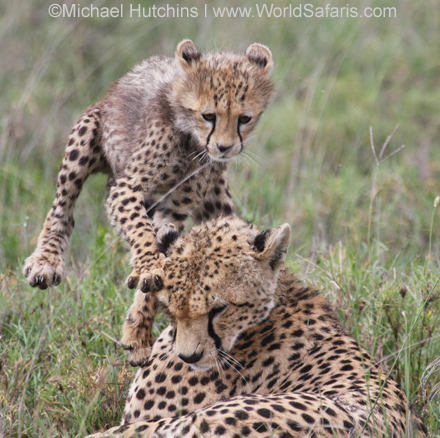During my last trip to the Serengeti in January, 2014, our group was fortunate enough to happen upon a female cheetah with a young cub in a remote area of the park. We had special permits to drive into this isolated region, where few other vehicles go. We had only seen one other vehicle that entire day and it was quite a distance away. We positioned our vehicle near the pair, but at a respectful distance, turned off the engine and quietly watched them for over two and a half hours.
At first, the animals reclined lazily in the tall grass, frequently scanning the area for any hint of danger. But, eventually, our patience paid off and the two began a long series of playful interactions that delighted our entire group. Behaving like an oversized housecat, the cub initiated this sequence of interactions by leaping on top of its mother’s head in a mock predatory attack. I was able to snap the accompanying picture at this time. Amazingly tolerant of her precious offspring, the female did little in return except to engage in gentle biting, eventually rolling over onto her back. The two wrestled for a bit and then the cub would move away, only to attack again. This went on for about a half an hour. There were few vocalizations, and those that did occur were very soft, which is generally characteristic of mammalian play. No need to draw the attention of predators, such as lions, when you are having so much fun! Both animals did appear to be enjoying themselves immensely. However, play behavior is serious business, practice for a time when the young cat will be required to kill its own prey or defend itself from predators or competitors.
Watching these two on the open savannah reminded me of the beauty of nature. It also reminded me that animals—even highly efficient predators, such as cheetahs–have a gentle and altruistic side, especially when it comes to their own offspring. One of the best lessons of this experience was that, when it comes to animal behavior, patience often pays off. While on Safari, it is best not to rush from one destination or experience to another; sometimes it is better to wait and savor what is to come. This is especially true when one comes across a unique situation, be it a pride of lions, a sleeping leopard, or a female cheetah and her young.


Recent Comments